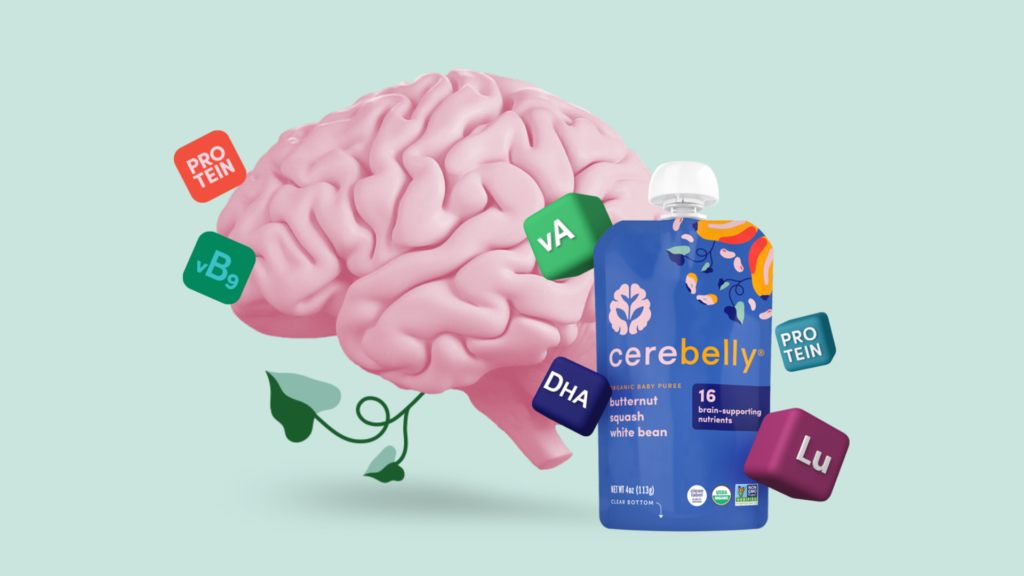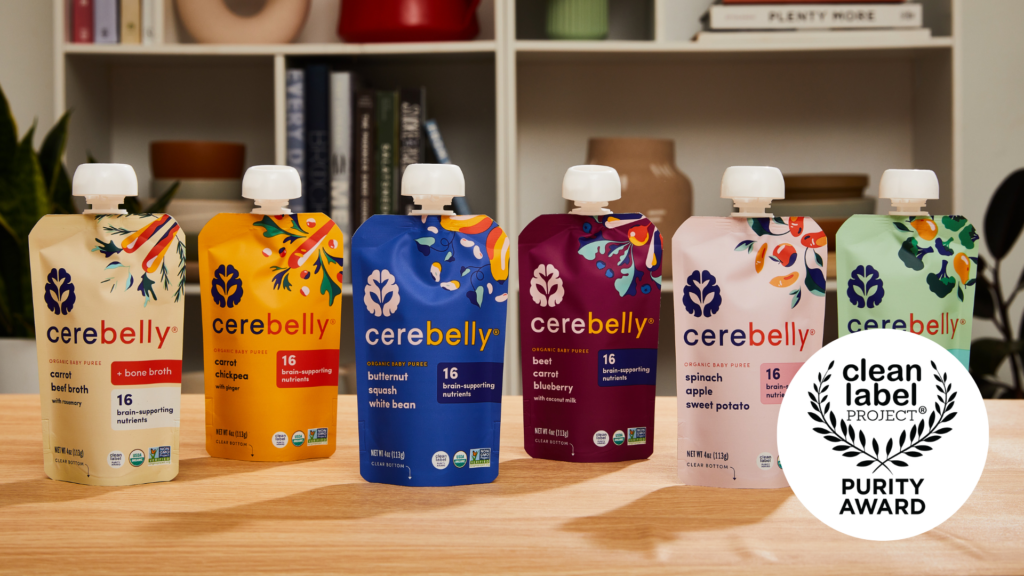5 Tips to Nourish a Baby's Hungry Brain
Your baby’s brain has a big appetite
Did you know their brain uses up more than half of the calories they get in a day? That’s a lot.
This is why babies need around 3 times the amount of calories per kilogram of body weight compared to adults. Not only that, but a baby’s brain has an extreme appetite for specific nutrients (more on that below).
Why does your baby’s brain need so much nutrition?
Because brain growth and development in the first 3 years of life is remarkably rapid. It’s pretty crazy if you think about it. Think of how quickly a baby goes from only sleeping, crying, peeing, pooping, feeding and snuggling — to smiling, socializing, remembering, planning, inferring, talking, walking, eating and showing emotion. All in the span of a couple years. Can you imagine if adults learned this much, this quickly?
Cerebelly’s founder, Dr. Teresa Purzner explains this so eloquently. She says that “The first three years are a period of extraordinary growth. The foundation for all baby’s milestones is laid down during this time. Unlike skin or muscle cells that constantly regenerate, the vast majority of brain cells you have at age 3 are the ones you will have for the rest of your life”.
Baby’s brain grows and develops optimally when it is properly nourished. But brain growth isn’t something you can see happening on the ‘outside’, like how tall they are getting or how quickly they grow out of their pajamas. So it’s easy to forget about it.
Think of how much emphasis we put on finding the right developmentally appropriate toys to foster learning. It’s equally, if not more important, to ensure our kids are getting the right nutrition to support their brain development.

5 tips to nourish your baby’s hungry brain
1. Give them foods that contain fat
Fat provides energy (calories). It’s part of the magic that helps them grow. Fat is not something to be afraid of when it comes to feeding kids. Not only is it important for energy but also for neuron (brain cell) myelination, which helps those brain cells communicate. This is what makes your kids smarter and more social each day.
The type of fat does matter, but I promise you that no one wakes up in the morning planning what ‘type’ of fat to serve today. I know it’s much more helpful to know which foods to offer. But because I’m a dietitian, and I admittedly can’t help myself, I’m going to give you both.
Emphasis should be on a variety of monounsaturated fat and polyunsaturated fat. But babies do also need some saturated fat and cholesterol. The body uses cholesterol to make bile salts which help in the digestion of fats.
Here’s a list of great options for serving up some dietary fat to babies/toddlers/kids:
Monounsaturated fat — olive oil, avocado and avocado oil, sunflower oil, pistachio butter, almond and other nut butter, egg yolk
Polyunsaturated fat — sunflower seed oil, avocado oil, *algal oil, sunflower seed butter, pumpkin seed butter, ground flaxseed, flaked or fork-mashed fish, egg yolk
Saturated fat — whole milk, coconut milk, meat, egg yolk, cheddar cheese, butter
*algal oil is a vegan source of omega 3 DHA that is essential for brain development.
2. Keep up with protein
Once your baby has started to drink less breastmilk/formula, and you are venturing on your journey with food, it’s important to include a source of protein at each meal and snack.
Pack in some protein with beans, lentils, seed or nut butters, crushed pumpkin seeds, cheese, chicken, beef, or yogurt.

3. Focus on iron-rich foods
Iron is one of the most critical micronutrients for babies brain development, in both structure and function. It’s important to note that the brain and other body tissues, like muscles, are first in line to use up the body’s available iron.
This means that the developing brain can already be iron deficient by the time a child is shown to have iron deficiency anemia on a blood test (1). The trick is to get ahead of the game and focus on iron rich foods as soon as solids are introduced. Some examples of iron rich foods are: beef, spinach, tofu, eggs and beans.
Click here for more on the topic of Babies and Iron.
4. Eat with your baby
Role modeling is one of the most rewarding parts of parenting. Your baby looks up to you and wants to do what you do! Endearing, and yes, at times tiring, it’s a developmental milestone that gives you an opportunity to teach your little one.
When it comes to eating, babies will reach for your food and try to copy you as you bring a spoon or fork to your own mouth. As they watch and learn, they will eat more and in turn be well nourished.

5. Focus on a variety of vegetables, beans, fish and meat
At the top of this article, I mentioned that young brains have an extreme appetite for certain nutrients. What this means is that these nutrients must be available to the brain as it grows and develops each brain region.
A few of these important nutrients found in these foods are: iron, zinc, omega 3 DHA, folate and choline. These nutrients are found in vegetables, beans, fish and meat.
References:
1) Georgieff MK. Iron Assessment to Protect the Developing Brain. Am J Clin Nutr. Vol 106 (S6), 1588S-1593S. 2017
Have more questions? Send us an email at support@cerebelly.com and we will be sure to get back to you!



